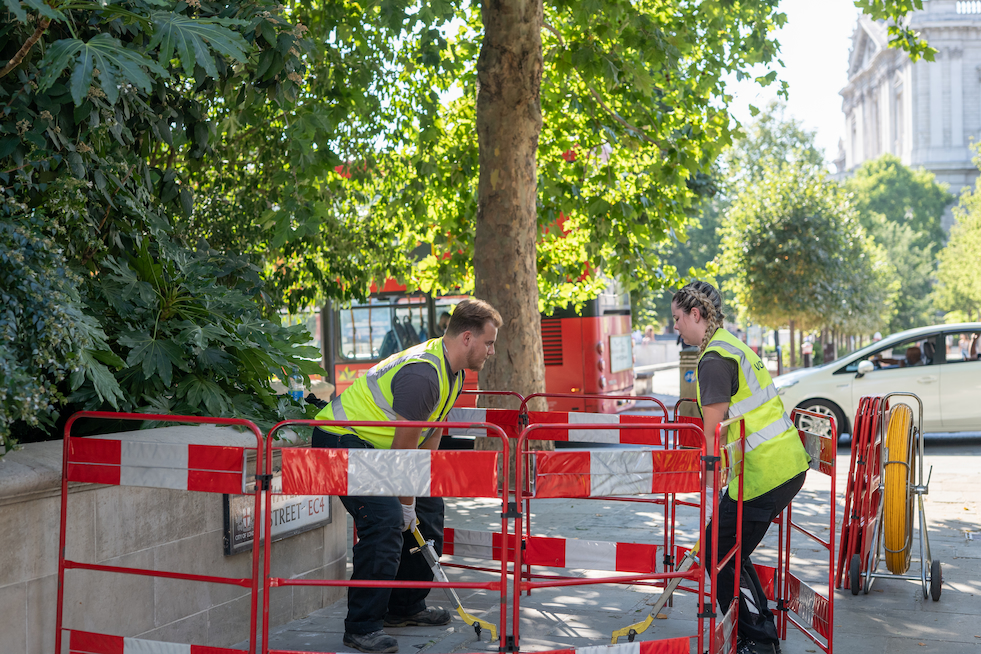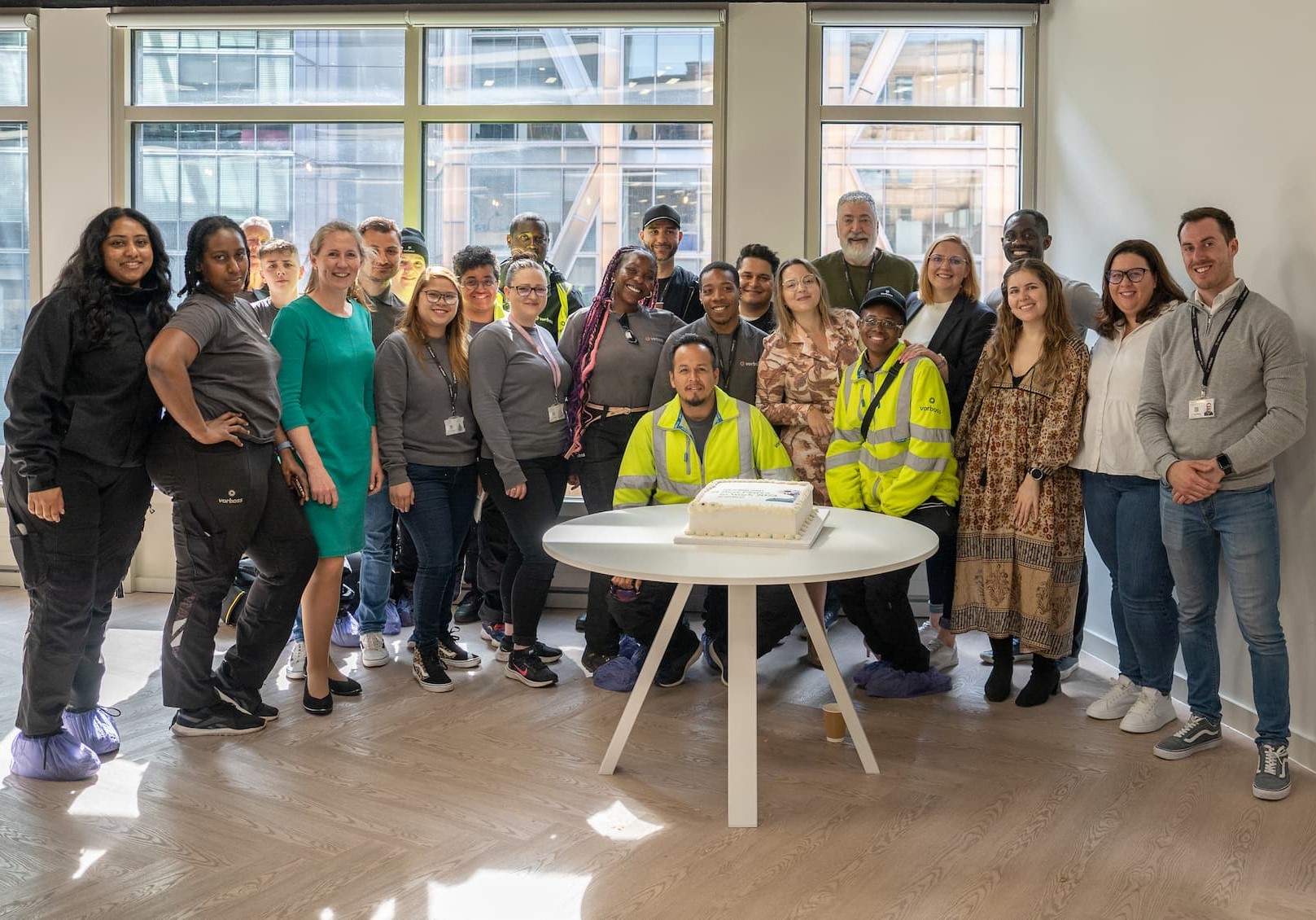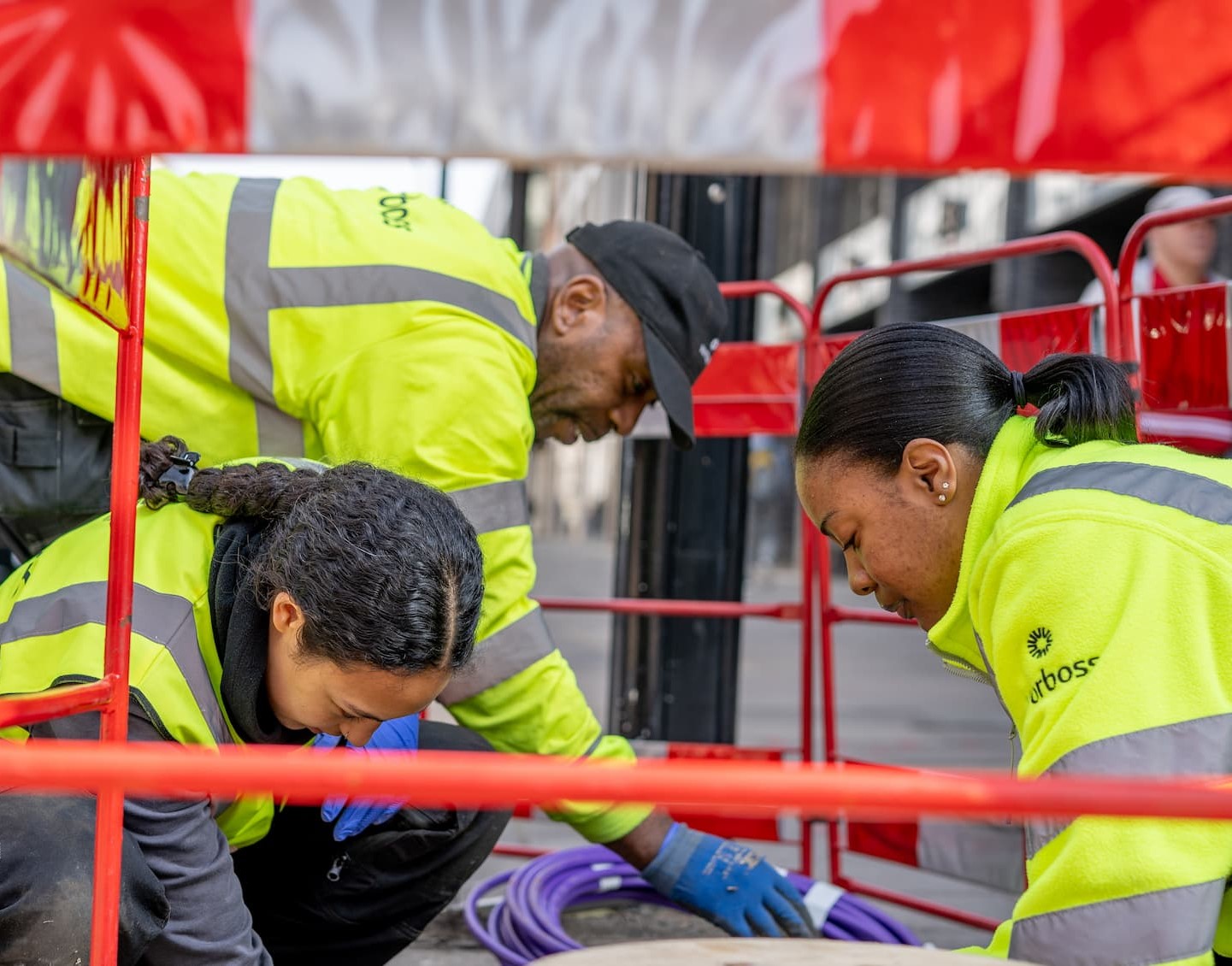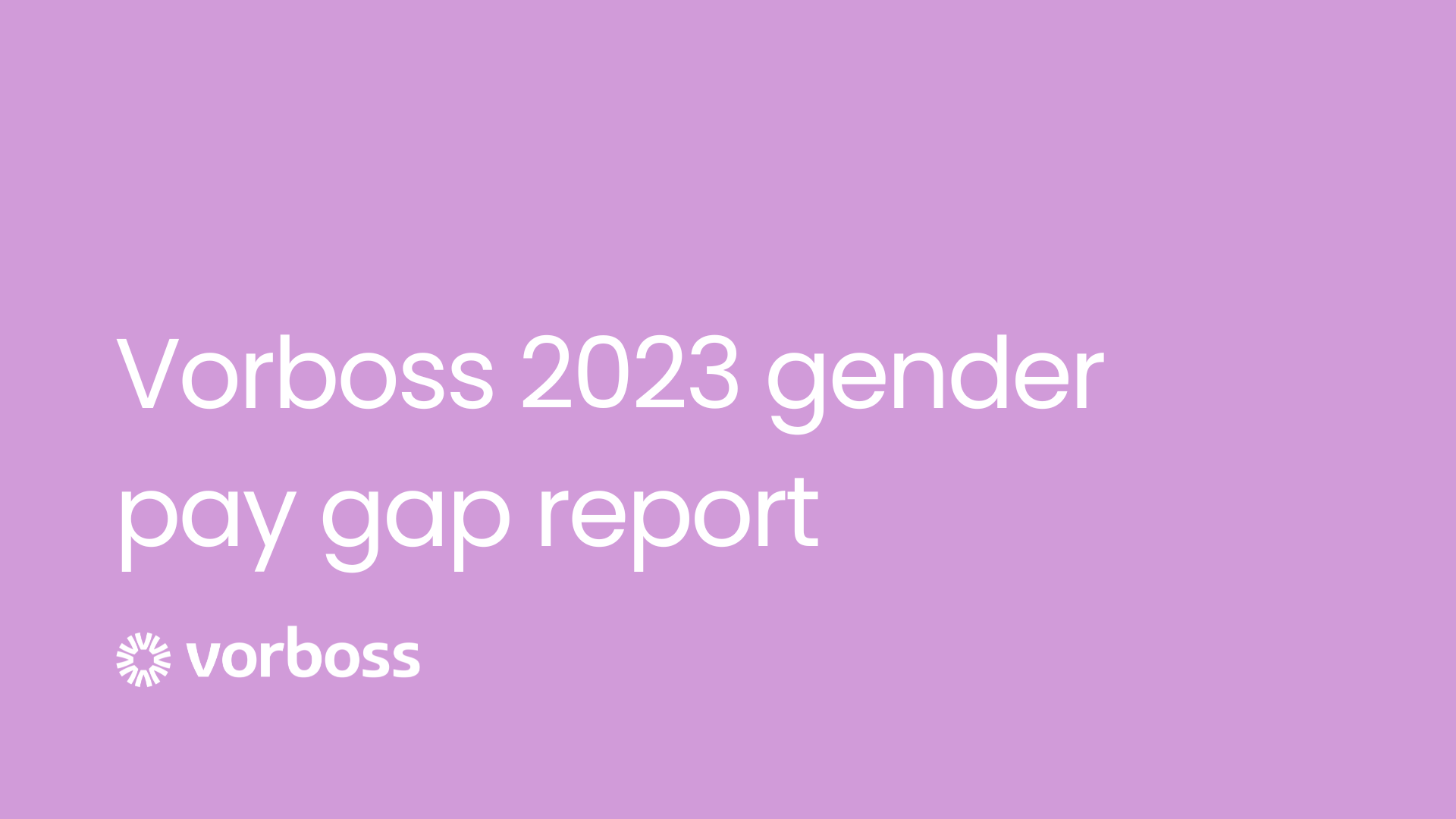
This September, we're celebrating our first anniversary since the Vorboss commercial launch.
In this Vorboss anniversary series, we sit down with some of our long-serving team members to learn about their journeys and discuss how they envision the future of Vorboss.
We're delighted to introduce Chief People Officer Rikshita Khela, who has been an integral part of the Vorboss family since 2012.
Vorboss anniversary: introducing Riks
'When I joined, there were just three of us in the office. Now, I’ll walk through London and see our adverts—it's so surreal.'
Looking ahead
We've had some remarkable achievements this year: expanding our fibre network across Central London, launching several new products, being recognised as one of the Best Places to Work by The Sunday Times, and, of course, connecting all our incredible customers.
This anniversary series showcases some of the dedicated team members who have made Vorboss a success. Every single person our customers interact with works in-house; they are the fabric of our business, and we are grateful for them!
Since 2020, we have installed over 500km of fibre optic cables to connect all commercial buildings in Central London, continually expanding a network unrivalled in scale and merit. If you're as excited about the future of the Vorboss fibre network as we are, follow us on LinkedIn to stay up to date with our latest innovations.
You can also discover how Vorboss can transform your business' connectivity by speaking to one of our experts.

This September, we're celebrating our first anniversary since the Vorboss commercial launch.
In this Vorboss anniversary series, we sit down with some of our long-serving team members to learn about their journeys and discuss how they envision the future of Vorboss.
We're delighted to introduce Head of Strategic Partnerships Matthew Chippendale, who has been an integral part of the Vorboss family since 2020.
Vorboss anniversary: introducing Matt
'It's not so much how big we've become as a business; it's more our reputation. If we're the go-to, obvious choice for businesses when they need a new Internet Service Provider, that will signify that we've made it.'
Looking ahead
We've had some remarkable achievements this year: expanding our fibre network across Central London, launching several new products, being recognised as one of the Best Places to Work by The Sunday Times, and, of course, connecting all our incredible customers.
This anniversary series showcases some of the dedicated team members who have made Vorboss a success. Every single person our customers interact with works in-house; they are the fabric of our business, and we are grateful for them!
Since 2020, we have installed over 500km of fibre optic cables to connect all commercial buildings in Central London, continually expanding a network unrivalled in scale and merit. If you're as excited about the future of the Vorboss fibre network as we are, follow us on LinkedIn to stay up to date with our latest innovations.
You can also discover how Vorboss can transform your business' connectivity by speaking to one of our experts.

When was the last time you noticed your business internet's ability?
Whether it’s waiting to transfer a large file or trying to collaborate on a cloud-based app, your business internet directly impacts performance across your working day.
Yet, most companies are so used to the drawbacks of 1Gbps business internet that these time lags and glitchy delays have become normalised despite their drain on operations.
Simply put, 1Gbps internet limits the potential of ambitious businesses. It lacks the capability required in 2023, let alone in the near future, with peak internet traffic increasing 35% year-on-year and the imminent growth of AI tools.
But don't worry, there is another way (spoiler alert: it's 10Gbps).
1Gbps = accepting limitations

1Gbps is the standard business internet in London, which is like buying an old sedan to win an F1 race. While it satisfies the most basic functions, it’s unsuited to modern demands, slow to accelerate, highly susceptible to breakdowns, and increasingly outdated with every passing month.
In short, it’s limiting your ability to drive faster and compete. Here’s why.
Productivity
Software, data, people, and communication power modern businesses. Therefore, employee productivity is inextricably linked to internet capacity.
From Slack and Salesforce to Zoom and Zendesk, the average business uses 130 software-as-a-service (SaaS) tools for its communications, project management, accounting, and HR functionality.
Not to mention video streaming, file transfers, data analysis, and multimedia downloads. No matter your business’ core proposition, your operational efficiency relies on your business internet.
1Gbps’ low data bandwidth can slow down daily tasks, hamper productivity, and frustrate employees. With 10Gbps internet, teams comple tasks 10X faster, and productivity (and employee morale) soar.
The business impact of high bandwidth internet is immediate and tangible. So why limit your bandwidth in the first place?
Connectivity
Hybrid working is here to stay.
In April 2023, Central London workers came into the office on average 2.3 days per week, with most employers supporting remote work in some capacity. And a good corporate internet connection is essential for private VPNs that allow remote users to access private company data.
Reliable online connectivity enables remote employees to access resources easily, participate in virtual collaboration effectively, and work productively. On the flip side, frequent connection drops interrupt important tasks and adversely impact customer service and employee morale.
1Gbps business internet does not provide enough reliability to banish connectivity concerns. Wouldn’t it be great if you could ensure uninterrupted connectivity for all your employees?
Scalability

Think about how many cloud-based apps your business currently uses. Now, think about how much you will use in the near future when more game-changing AI products hit the market and quantum computing becomes the norm.
With data requirements doubling every two years, you need internet that can flexibly scale to your evolving data processing needs and easily handle more users as your business expands.
1Gbps business internet might satisfy your basic requirements today, but you need to plan for the impending surge of new data requirements to remain competitive. So why not get ahead of your rivals now instead of playing catch-up down the line?
Customer experience

How do you work with your clients or customers?
If your company uses real-time collaboration tools like Miro whiteboards to brainstorm ideas or Zoom conferencing services to host interactive webinars or even basic video calls, then reliable connectivity is your lifeblood; these tools don’t work if there isn’t enough bandwidth.
But, limited connectivity also impedes customers' online interaction with your business, such as unresponsive customer service or slow-to-load digital products, leading to frustrated customers, negative brand reputation, and ultimately a loss of business.
1Gbps’ limited connectivity might work now, but if you take on more customers or need to fulfil more orders, you may find yourself stuck in first gear with no way to accelerate. Why run the risk?
10Gbps = going limitless
It’s unlikely you’d accept ‘standard’ with any other part of your business, so why accept ‘standard’ with your business internet?
As technology develops, costs fall and the playing field changes. Netflix’s affordable subscription streaming made us forget about TV scheduling. Mobile network providers' unlimited packages made us forget about the cost of phone calls.
Now, 10Gbps is having the same effect on business internet, helping us forget about connectivity and reliability issues while making your business more productive and scalable. Businesses all across London are waking up to this, and the ship is turning. At Vorboss, we provide 10Gbps as standard (rather than the limit), as that's a sensible, technical minimum in 2023.
And, as we own the network, maintain the cables, and directly provide the customer connection, we can easily scale your data requirements as you grow, future-proofing your long-term business growth.
Without the limitations of 1Gbps, you’ll never notice your business internet again.
Book a consultation to find out why businesses are switching to Vorboss.

In an exciting development for the telecommunications industry, our CEO, Tim Creswick, has been appointed as the new Chair of the Board of Directors at the Institute of Telecommunications Professionals (ITP).
This appointment recognises Tim's outstanding leadership in breaking down employment barriers and promoting equity, inclusion, and diversity within telecoms. With Tim leading the way, Vorboss has worked with the ITP over the years to employ apprentices from diverse backgrounds, fostering access and equality on a broader scale in the sector.
As the new ITP Chair, Tim will collaborate with regulators, government associations, and other leading bodies on projects crucial to the industry's future. He will also share best practices with global businesses and educational institutions, amplifying the positive impact of his initiatives.
Let's take a closer look at how Tim and our team at Vorboss are transforming the industry and empowering a new generation of professionals.
Expanding opportunities for Londoners

The ITP is a not-for-profit organisation addressing the UK's digital skills gap. They are changing the telecoms landscape by working with employers and the wider industry to build a sustainable and diverse workforce.
Vorboss aligns with this mission, taking a committed approach to building our team in a way that challenges the status quo. We collaborate with the ITP to tap into diverse talent pools and welcome telecoms industry newcomers, creating over 300 new jobs for Londoners.
Tim and Vorboss feel strongly that anyone with the right attitude should have the opportunity to build a career in telecoms. We’re working hard to break those barriers.
Vorboss Training Academy
The ITP helped us launch the Vorboss Academy in 2021 to increase our intake of apprentices. This accredited in-house programme gives those unfamiliar with telecoms the skills they need to kickstart a career in the industry.
We now have the industry's most diverse fibre installation team; nearly 40% of our field-based Installation Team are women. The ITP's emphasis on developing people and bridging skills gaps has been integral to the growth and success of our field team, with participants gaining qualifications, experience, and a robust professional network.
D&I at Vorboss

From the beginning, we have been committed to building a workplace that revolves around our people. Our recent recognition by The Sunday Times as one of the best places to work in the UK, especially for women, reflects that.
Diversity and accessibility in telecoms have long been crucial challenges. Tim has advocated for a proactive approach, noting, 'We're only going to change the face of the industry if we continue to attract a diversity of thought and talents in the coming decades.'
Attracting diverse talent is just the beginning; providing a supportive environment where all types of people can grow is vital to breaking barriers in a long-term, sustainable way. Our passionate team has been pivotal in cementing our position as the market leader in fibre connectivity; we firmly believe that people and culture are the bedrock of a thriving business.
Tim's vision
Tim's aim is to inspire change on a broader scale, leveraging his position to promote hiring based on attitude and training skills, as Vorboss has successfully done.
'I'm passionate about improving access, diversity, and equality in a traditionally rather stale sector. While we've been able to make great strides at Vorboss, the ITP role provides an agnostic platform from which I can champion these ideas across the industry, with a far greater reach than we could ever achieve as just one company.'
Stay tuned for more exciting developments as Tim Creswick, Vorboss, and the ITP continue to shape a vibrant and sustainable telecoms industry.

At Vorboss, we have completely transformed business connectivity in London. By building a vertically integrated organisation, we have created a dedicated business fibre network that is driving London towards 10Gbps as a standard, a change that businesses desperately need.
Our innovative business model has allowed us to build a network with significantly more capacity—we start where others top out, connecting customers up to 100Gbps at market-leading rates. We also get customers connected much faster than the current industry standard, setting us apart.
Why did we throw out the traditional telecoms playbook? So we could redefine what's possible for London's underserved businesses. The Vorboss way isn't just a different way—it's a better way, and this is how we did it.
Building a disruptive business model

Building London's best full-coverage business fibre network was no small feat. 70% of the UK's connectivity demands are in Central London, but an ageing incumbent internet operator serves 80% of that market. It can't meet the needs of modern businesses, which is why we came in and built our network with the latest technology and newest design.
We built a future ready network that serves ambitious businesses. To date, we've deployed over 500 km of network in three years—a scale no other fibre company has taken on in Central London, especially in such a short amount of time.
We achieved this through vertical integration; by owning the entire value chain from fibre to service delivery, we have complete control over the quality and build of our network. We offer our customers the highest levels of reliability and flexibility, which isn’t possible with a traditional telecoms model.
Putting customers first
Unlike most telcos, we started by thinking about customers’ needs and worked backwards. A laser focus on market-leading bandwidth, capacity, and delivery has resulted in unassailable products for London's enterprises.
Vorboss is the only vertically integrated Internet Service Provider (ISP) dedicated to business in London. Our people-focused operational model maximises efficiency and delivers an outstanding customer experience.
Powering an unconventional model

Our belief that people come first and assets second led us to create an unconventional model for powering our network.
Creating a motivated workforce
To be truly vertically integrated, we had to start with our workforce. We created a certified training academy that takes people with zero telecoms experience and qualifies them to build our network. We are one of only a few UK ISPs that do all their training in-house; while it may not be the easy option, it is the only way to deliver the quality standard necessary for our ambitious customers.
Keeping our training in-house allows us to build diversity and inclusion into our team, addressing the industry's significant diversity problem from the ground up. By looking at real-life people rather than numbers, we have created a team that is engaged, motivated, and willing to think differently to solve problems for customers. This approach makes good business sense, but it's also the right thing to do; future decision-makers will want to buy from companies that share their values.
From planning to customer support, it is an exceptional customer experience from end-to-end. Our customers will only ever speak to members of the Vorboss team, not contractors.
Moving people and assets separately

Many of our employees are young Londoners who rely on public transportation to get around the city. Rather than limiting our talent pool to those who can drive, we developed a system where we separated personnel and resources.
Our model enables Installation Technicians to travel to site via public transportation. We hire professional drivers to transport tools and equipment to workers in the field. This separation allows our teams to deliver a better product by moving faster and working more efficiently.
Building our own software
Early on, we saw that we needed more than off-the-shelf software solutions to power our innovative model. We have assembled a team of 25 Software Developers (and growing), led by our Chief Information Officer, so we can move at speed and build customer-facing products that are fit for purpose.
Our Software team has built a data management platform that sees the relationships between all business data. They build tools to aid deployment and network operation; for example, they developed a tool that finds all customers affected by a given fault. Using low-code prototypes, business problems are solved in minutes rather than hours.
By having a dedicated Software team working on our core business functionality, we increase yield for the rest of the business. This allows us to operate with agility, build solutions that our customers need, and make strategic decisions based on real-time data.
Setting a new standard

Our organisation is made for change. Our network will accommodate the evolving economic climate, as well as the growing needs of our customers, to secure London’s position in the global economy.
After growing a workforce of around 400 and building the ability to connect over 120,000 businesses in Central London, we can safely say that our model works. Backed by the Fern Trading Group, which is advised by Octopus Investments, our fresh approach and extensive premium network, combined with a team that reflects the communities it serves, has made us the best and largest business-only fibre network in Central London.
If you would like to learn more about getting connected with us, speak to one of our experts today.

Exciting news! Vorboss has been recognised as one of the Sunday Times Best Places to Work in the UK and Best Places to Work for Women. We couldn't be happier to be recognised for our commitment to creating an inclusive workplace culture within the telecoms industry. Being listed among the 40 best employers in Britain is a real milestone for us.
As the UK's only dedicated enterprise fibre network, our emphasis on inclusion, equity, and diversity has positioned us as a leader in driving positive change within the tech space. This wouldn't have been possible without our people-centric approach that runs through all areas of the business, and we are proud to be recognised by the prestigious Sunday Times Best Places to Work awards.
Jaye O'Callaghan, our Chief People Officer, says, 'We have worked tirelessly to make Vorboss a destination for some of the most ambitious, hard-working and friendly people. We're proud to be the flag bearer for the whole telecommunications industry and are thrilled that our team has been acknowledged in this way.'
Let's dive deeper into how Vorboss embraces diversity, promotes accessibility, invests in employee development, and supports women in the workplace. We're here to reshape the telecoms industry, and this recognition from the Sunday Times fuels our passion even more.

Putting people first
The Sunday Times Best Places to Work awards are all about the employees, so the results are solely based on a survey sent out to our incredible team. With topics ranging from reward and recognition to empowerment and wellbeing, the survey covers it all and is considered a trusted barometer of employee-centric businesses across industries.
We have built a workplace that revolves around our people, with a focus on diversity, accessibility, and employee development. Supporting women in the workplace is also a top priority for us.
Our goal? To provide the absolute best job experience for our employees while prioritising their individual needs.
Embracing diversity and accessibility

In the telecoms industry, diversity and accessibility have long been crucial challenges; that's why we have adopted a proactive approach. Our CEO and founder Tim Creswick comments, 'We're only going to change the face of the industry if we continue to attract a diversity of thought and talents in the coming decades.'
We firmly believe that people and culture are the bedrock of a thriving business. From day one, we've implemented a wide range of initiatives to support employees from various backgrounds and cultivate a genuinely diverse, engaged, and motivated workforce.
A shining example of this commitment is our in-house training academy. The Vorboss Academy is designed to be inclusive, requiring no prior experience and serving as a pathway to a telecoms career for anyone who aspires to it. We're proud to offer this opportunity to individuals from various backgrounds, ensuring that a career in telecoms is accessible to all.
Nurturing growth and development
We strongly emphasise continuous employee development. We start by going the extra mile to empower our team with additional educational resources. If they have a specific request for further education, professional development, mentorship, or professional certifications, we're here to make it happen. Our office library is also stocked with a selection of self-development books, providing a wealth of knowledge and inspiration.
Investing in our team's growth is essential for their success and satisfaction. That's why we've introduced a unique opportunity for all our staff: an additional 5% of their salary dedicated to life-enhancing training. We want our employees to be free to choose the training opportunities that resonate with them, whether it's leadership coaching or swimming lessons, to support their personal and professional enrichment.
Empowering women in the workplace

We take great pride in being recognised as a workplace that provides unwavering support for women. We work diligently to create an inclusive environment where all individuals feel valued. Our commitment to gender equality is reflected in our operations and recruitment practices.
We've taken significant strides in diversifying our workforce by actively recruiting female Installation Technicians, Warehouse Operatives, and Mobile Field Support members. This intentional focus on gender diversity has fostered a diverse and vibrant workplace. Not only does this contribute to better employee retention, but it also attracts new talents who are inspired by our inclusive culture. In fact, within the telecoms industry, our Installation Team boasts an impressive 35% representation of women, a unique achievement.
We're determined to break barriers and set new standards in the telecoms sector and beyond. Our vision is to see more women occupying critical roles across our business, paving the way for a more equal and gender-balanced workforce. By championing gender diversity, we strive to create a workplace that is representative of the world we live in.
To ensure inclusivity, we've implemented specific measures that address the unique needs of women in the workplace. We provide welfare vans that offer privacy and relief to our Installation Technicians. Specially sourced tools and uniforms are available to ensure the perfect fit for women. Additionally, we recognise the importance of period days, flexible work arrangements, and family-friendly policies.
Leading the way for positive change
Our initiatives should become the industry standard, fostering high-performance teams, inclusive workplace cultures, and sustainable business practices.
As Tim Creswick puts it, 'It's fantastic to be recognised as one of the UK's best companies to work for, not just in telecoms, but across all sectors. We hope this signals a positive change in how telecoms companies are regarded in the wider UK market. We're only going to change the face of the industry if we continue to attract a diversity of thought and talents in the coming decades, and this marks an important milestone in recognising the immense effort invested by our team to date.'
Thanks to the Sunday Times for naming us as one of the best places to work in the UK and highlighting the inclusive workplace culture we're so proud of.
We're hiring! Visit the vacancies section of our website to check out our live roles.





